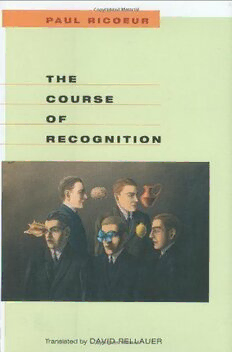Download The Course of Recognition PDF Free - Full Version
Download The Course of Recognition by Paul Ricoeur in PDF format completely FREE. No registration required, no payment needed. Get instant access to this valuable resource on PDFdrive.to!
About The Course of Recognition
Recognition, though it figures profoundly in our understanding of objects and persons, identity and ideas, has never before been the subject of a single, sustained philosophical inquiry. This work, by one of contemporary philosophy's most distinguished voices, pursues recognition through its various philosophical guises and meanings--and, through the "course of recognition," seeks to develop nothing less than a proper hermeneutics of mutual recognition. Originally delivered as lectures at the Institute for the Human Sciences at Vienna, the essays collected here consider recognition in three of its forms. The first chapter, focusing on knowledge of objects, points to the role of recognition in modern epistemology; the second, concerned with what might be called the recognition of responsibility, traces the understanding of agency and moral responsibility from the ancients up to the present day; and the third takes up the problem of recognition and identity, which extends from Hegel's discussion of the struggle for recognition through contemporary arguments about identity and multiculturalism. Throughout, Paul Ricoeur probes the significance of our capacity to recognize people and objects, and of self-recognition and self-identity in relation to the gift of mutual recognition. Drawing inspiration from such literary texts as The Odyssey and Oedipus at Colonus, and engaging some of the classic writings of the Continental philosophical tradition--by Kant, Hobbes, Hegel, Augustine, Locke, and Bergson--The Course of Recognition ranges over vast expanses of time and subject matter and in the process suggests a number of highly insightful ways of thinking through the major questions of modern philosophy. (20070101)
Detailed Information
| Author: | Paul Ricoeur |
|---|---|
| Publication Year: | 2005 |
| ISBN: | 9780674025646 |
| Pages: | 311 |
| Language: | English |
| File Size: | 3.621 |
| Format: | |
| Price: | FREE |
Safe & Secure Download - No registration required
Why Choose PDFdrive for Your Free The Course of Recognition Download?
- 100% Free: No hidden fees or subscriptions required for one book every day.
- No Registration: Immediate access is available without creating accounts for one book every day.
- Safe and Secure: Clean downloads without malware or viruses
- Multiple Formats: PDF, MOBI, Mpub,... optimized for all devices
- Educational Resource: Supporting knowledge sharing and learning
Frequently Asked Questions
Is it really free to download The Course of Recognition PDF?
Yes, on https://PDFdrive.to you can download The Course of Recognition by Paul Ricoeur completely free. We don't require any payment, subscription, or registration to access this PDF file. For 3 books every day.
How can I read The Course of Recognition on my mobile device?
After downloading The Course of Recognition PDF, you can open it with any PDF reader app on your phone or tablet. We recommend using Adobe Acrobat Reader, Apple Books, or Google Play Books for the best reading experience.
Is this the full version of The Course of Recognition?
Yes, this is the complete PDF version of The Course of Recognition by Paul Ricoeur. You will be able to read the entire content as in the printed version without missing any pages.
Is it legal to download The Course of Recognition PDF for free?
https://PDFdrive.to provides links to free educational resources available online. We do not store any files on our servers. Please be aware of copyright laws in your country before downloading.
The materials shared are intended for research, educational, and personal use in accordance with fair use principles.

